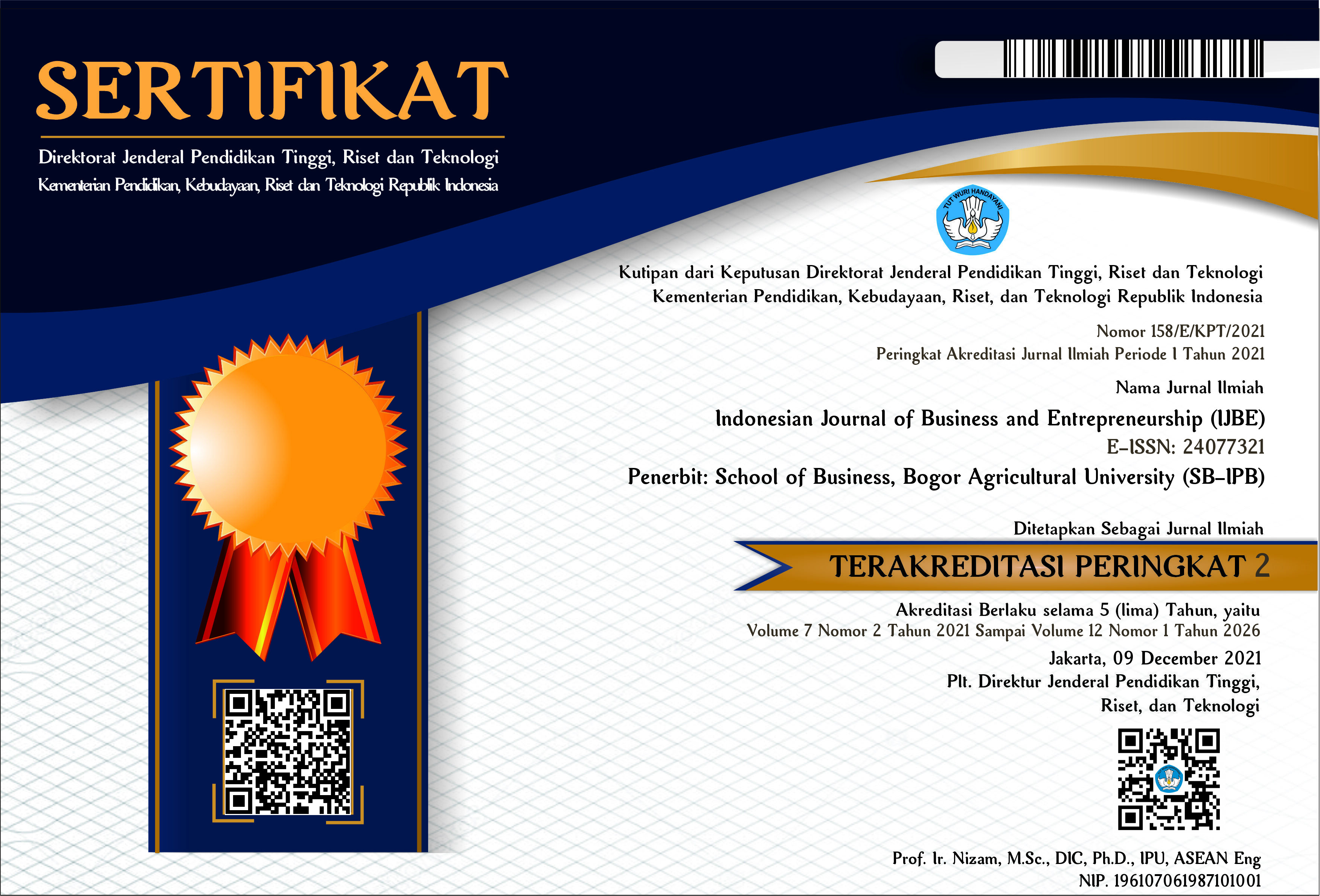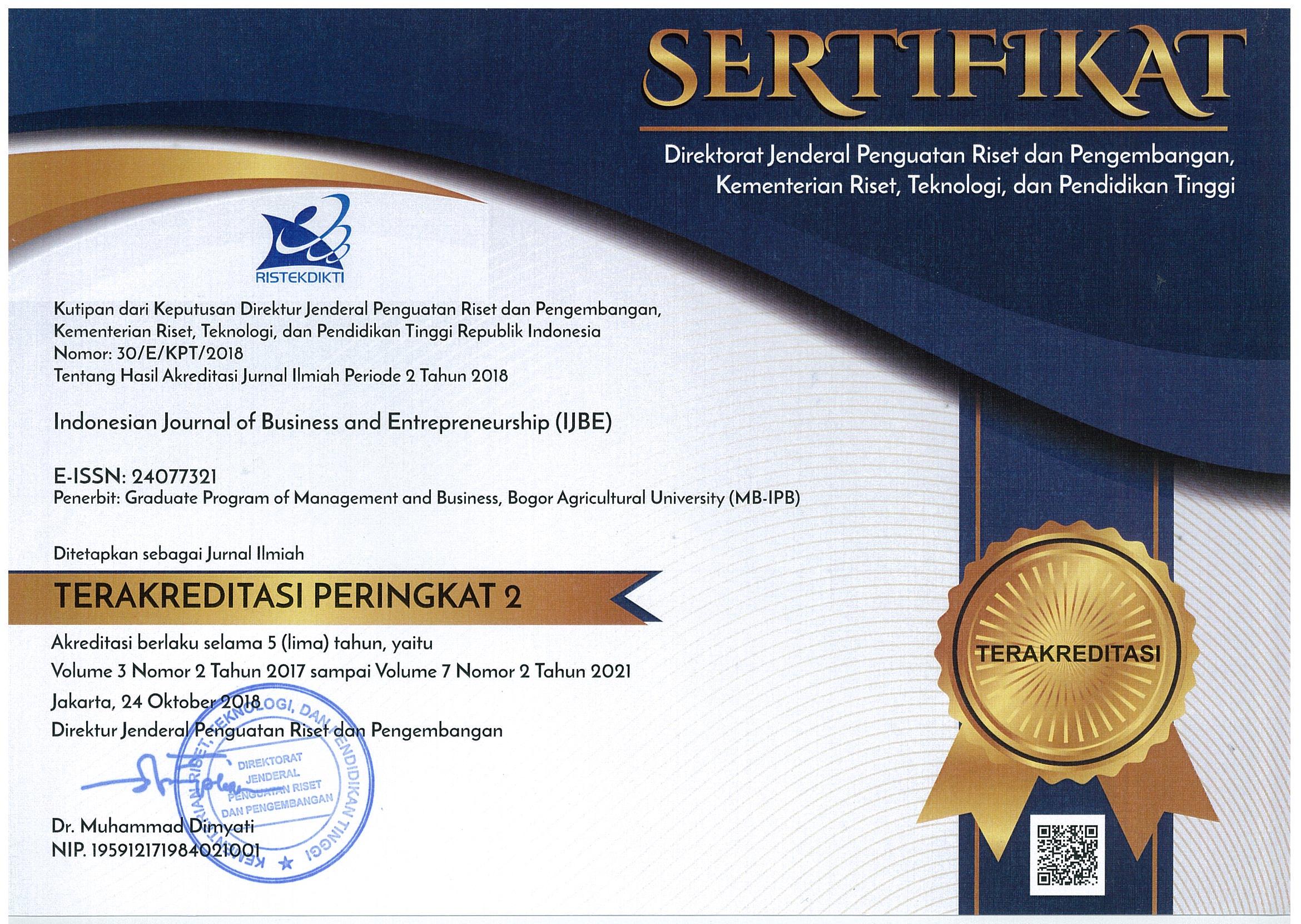An Analysis of Personality Traits of Indonesian Start-Up Entrepreneurs Based on Social Media Footprint
Abstract
The objective of this research was to analyze the personality traits of successful Indonesian start-up entrepreneurs whose businesses were in the top 200 based on start-upranking.com. Using IBM Watson Personality Insights, the Big Five personality traits from 27 samples were measured. The Big Five personality traits include openness, conscientiousness, extraversion, agreeableness, and neuroticism. The data were analyzed using descriptive statistics and mean comparison. Mann-Whitney U test was used to determine the difference in personalities between genders, while the Spearman test was utilized to identify the correlation between education level and personalities. The results revealed that Indonesian start-up entrepreneurs tended to be more open, more conscientious, moderate in extraversion, less agreeable, and more neurotic (O+, C+, E, A-, N+). There was no personality difference in different genders and no correlation between education level and personality traits either. The results of this study should serve as a point of departure for future studies on start-up entrepreneurs’ personality traits in Indonesia. Additionally, future studies are suggested to employ a larger number of samples from different countries.
Keywords: angel investors, big five personality traits, Indonesian entrepreneurs, social media analysis, start-up
Downloads
References
Aaker DA, Kumar V, Day GS. 2006. Marketing Research. 8th ed., Hoboken, NJ: Wiley
Alizadeh A, Weber I, Cioffi-Revilla C, Fortunato S, Macy M. 2017. Psychological and Personality Profiles of Political Extremists. Retrieved from: https://arxiv.org/abs/1704.00119
Antoncic B, Kregar TB, Singh G, DeNoble AF. 2015. The Big Five Personality-Entrepreneurship Relationship: Evidence from Slovenia. Journal of Small Business Management 53(3): 819-841. doi: 10.1111/jsbm.12089
Arikunto S. 2010. Prosedur Penelitian: Suatu Pendekatan Praktik. (Edisi Revisi). Jakarta: Rineka Cipta
Arthur W, Graziano W. 1996. The Five-Factor Model, Conscientiousness, and Driving Accident Involvement. Journal of Personality 64(3):593-618.
Cooper DR, Schindler PS. 2014. Business Research Methods. 12th Ed. New York: McGraw-Hill Education
Costa PT, McCrae RR. 1990. Personality disorders and the five-factor model of personality. Journal of Personality Disorders 4(4): 362-371. http://dx.doi.org/10.1521/pedi.1990.4.4.362
Costa PT, McCrae RR. 1992. Revised NEO Personality Inventory (NEO-PI-R) and NEO Five-Factor Inventory (NEO-FFI) professional manual. Odessa, FL: Psychological Assessment Resources.
Dutta K, Singh VK, Chakraborty P, Sidhardhan SK, Krishna BS, Dash C. 2017. Analyzing Big-Five Personality Traits of Indian Celebrities Using Online Social Media. Psychological Studies 62(2):113-124. https://doi.org/10.1007/s12646-017-0408-8
Hartono DA, Asgha B, Halim MS, Oktobriando A, Ngan E, & Liandi, J. 2018. Analisis Karakter Pengusaha Start-up Dunia berdasarkan Rekam Jejak Digital di Sosial Media. Indonesia Journal of Entrepreneurship 4 (1): 96-107.
Hechavarria D, Ingram A. 2016. The entrepreneurial gender divide: hegemonic masculinity, emphasized femininity, and organizational forms. International Journal of Gender and Entrepreneurship 8(3): 1-39.
Hu T, Xiao H, Luo J, Nguyen T T. 2016. What the Language You Tweet Says About Your Occupation. Paper presented at the Tenth International AAAI Conference on Web and Social Media (ICWSM 2016), Cologne, Germany. Retrieved from: www.aaai.org/ocs/index.php/ICWSM/ICWSM16/paper/download/13020/12738
Kasmir. 2012. Manajemen Perbankan. Jakarta: PT RajaGrafindo Persada
Kerr SP, Kerr WR, Xu T. 2017. Personality Traits of Entrepreneurs: A Review of Recent Literature. Retrieved from: https://www.hbs.edu/faculty/Publication%20Files/18-047_b0074a64-5428-479b-8c83-16f2a0e97eb6.pdf
Leutner F, Ahmetoglu G, Akhtar R, Chamorro-Premuzic T. 2014. The relationship between the entrepreneurial personality and the Big Five personality traits. Personality and Individual Differences 63:58-63. http://dx.doi.org/10.1016/j.paid.2014.01.042
McCrae RR, Costa PT. 1987. Validation of the five-factor model of personality across instruments and observers. Journal of Personality and Social Psychology 52(1): 81-90. http://dx.doi.org/10.1037/0022-3514.52.1.81
McCrae RR, Costa PT. 1991. The NEO Personality Inventory: Using the Five-Factor Model in counseling. Journal of Counseling & Development 69(4): 367-372. http://dx.doi.org/10.1002/j.1556-6676.1991.tb01524.x
Mostafa M, Crick T, Calderon AC, Oatley G. 2016. Incorporating Emotion and Personality-Based Analysis in User-Centered Modelling. In: Bramer M., Petridis M. (eds) Research and Development in Intelligent Systems XXXIII. SGAI 2016. Springer, Cham.
Na WB, Marshall R. 1999. Validation of the “Big Five” Personality Traits in Korea. Journal of International Consumer Marketing 12(1):5-19.
Norman WT. 1963. Toward an adequate taxonomy of personality attributes: Replicated factor structure in peer nomination personality ratings. Journal of Abnormal and Social Psychology 66:573-583.
Obschonka M, Fish C, Boyd R. 2017. Using digital footprints in entrepreneurship research: A Twitter based personality analysis of superstar entrepreneurs and managers. Journal of Business Venturing Insights 8: 13-23.
Palich LE, Bagby DR. 1995. Using cognitive theory to explain entrepreneurial risk-taking: Challenging conventional wisdom. Journal of Business Venturing, 10(6): 425-438.
Pines AM, Lerner M, Schwartz D. 2010. Gender differences in entrepreneurship. Equality, Diversity and Inclusion: An International Journal 29(2): 186-198.
Rothmann S, Coetzer E. 2003. The Big Five Personality Dimensions and Job Performance. SA Journal of Industrial Psychology 29 (1):68-74.
Ryan T, Xenos S. 2011. Who uses Facebook? An investigation into the relationship between the Big Five, shyness, narcissism, loneliness, and Facebook usage. Computers in Human Behavior 27(5): 1658-1664. https://doi.org/10.1016/j.chb.2011.02.004
Schober P, Boer C, Schwarte LA. 2018. Correlation Coefficients: Appropriate Use and Interpretation. Anesthesia & Analgesia 126(5): 1763-1768.
Shao AT. 2002. Marketing Research: An aid to decision making. 2nd Ed., Ohio: Thomson Learning.
Startup Ranking. 2019. Startup Ranking Indonesia—Top. Retrieved June 17, 2019 from: http://www.startupranking.com/top/indonesia
Thies F, Wessel M, Rudolph J, Benlian A. 2016. Personality Matters: How Signaling Personality Traits Can Influence the Adoption and Diffusion of Crowdfunding Campaigns. Paper presented at the 2016 European Conference on Information System. Retrieved from: http://aisel.aisnet.org/ecis2016_rp/36
Tupes EC, Christal RE. 1961. Recurrent personality factors based on trait ratings (USAF ASD Technical Report No. 61-97). Lackland Air Force Base, Texas: US Air Force.
Widyasthana GNS, Wibisono D, Purwanegara MS, Siallagan M. 2017. Corporate Venture Capital Variable for Investing on Start-up in Indonesia. International Journal of Innovation and Research in Educational Sciences, 4(3): 2349–5219.
Zhao H, Seibert SE. 2006. The big five personality dimensions and entrepreneurial status: A meta-analytical review. Journal of Applied Psychology 91: 259–271.







